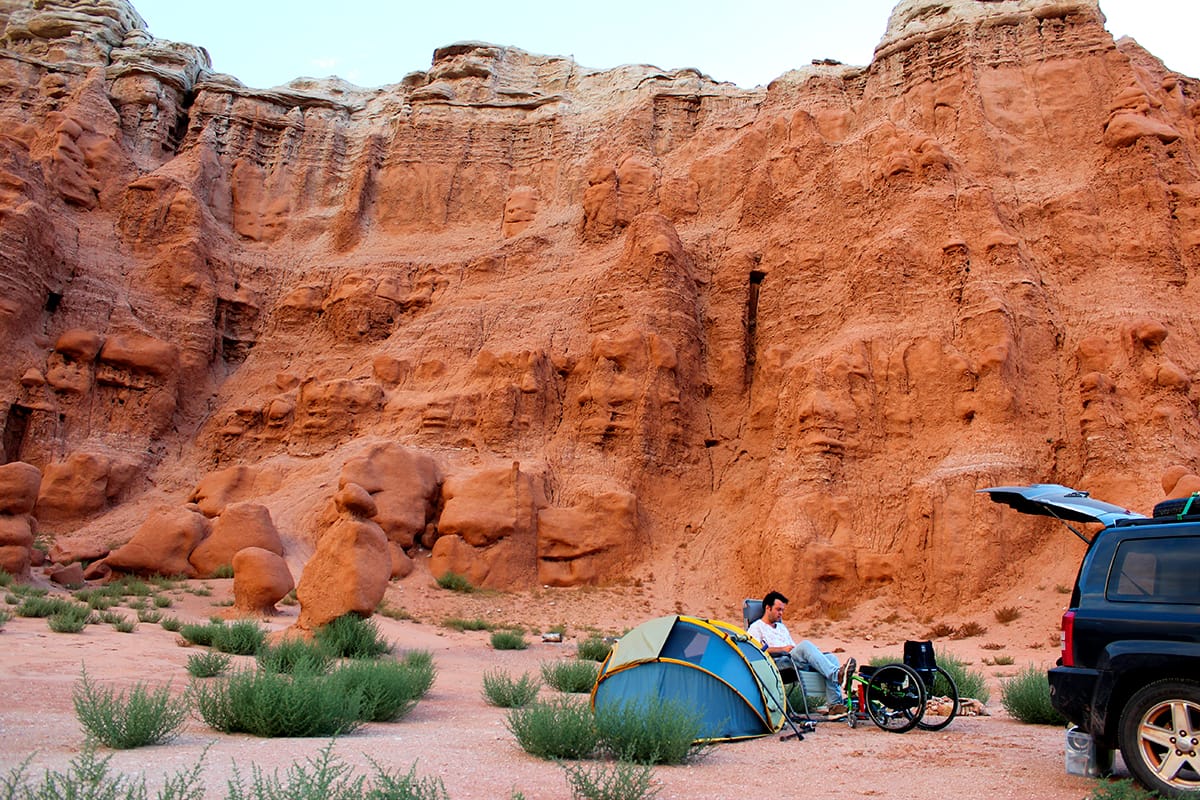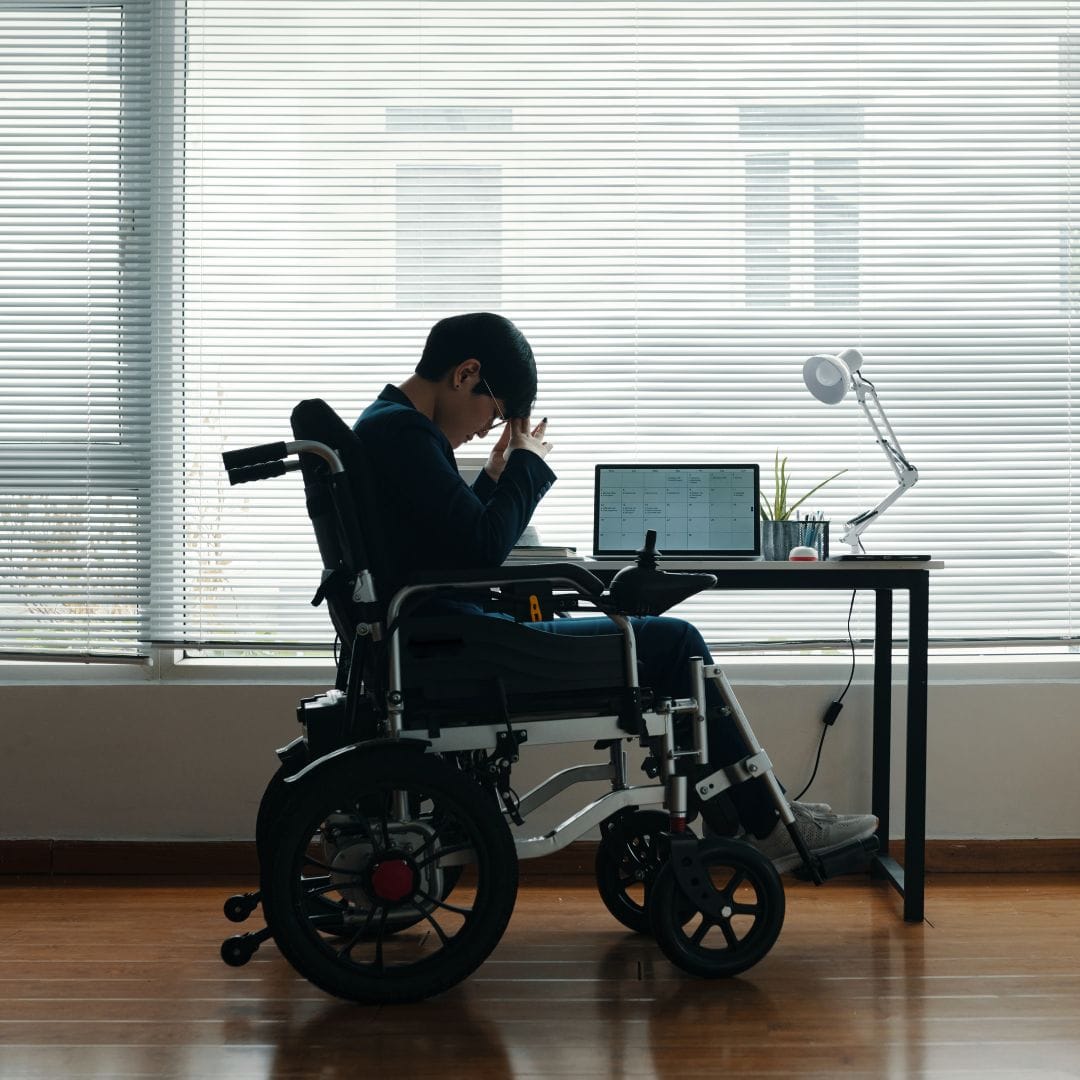Camping is meant to be fun and adventurous, but for people with physical disabilities a night spent in nature can seem daunting and uncomfortable. The good news: camping is still possible (and enjoyable) after SCI!
Our SCI BC Peer Program Coordinator, paraplegic and intrepid outdoorsman Ryan Clarkson shares his top SCI camping tips for a successful sleepover in the Great Outdoors.

I was a traveller before my spinal cord injury; I wanted to be a traveller after. I wanted to push myself physically and mentally—to feel like my old self. Camping, I get to see sunrises in the desert, sunset in the Alaskan tundra, and everything in between. I find new perspectives, meet like-minded people, and learn from my mistakes.
Even in this new body, I push my limits. I fail, I try again, and I succeed. Camping makes me stronger.
Here are five key things I’ve learned to keep in mind as a camper with a spinal cord injury.
Pick the Right Spot
Whether it is a provincial park campground, or a primitive spot you found on a map, picking the right spot is important for a good night’s sleep and ease of mobility. A soft ground looks great for comfort, but will most likely turn into quicksand ten minutes after your wheelchair has gone over it. Because of a wheelchair, harder ground is preferred. Dead grass, flat desert floor, and concrete give the best options for mobility in the campground. Also remember to put that tarp under your tent if it is going to rain!
Don’t Be Scared to Push Your Boundaries
You should know what your personal boundaries are and go right up to that line. My boundaries are physical pain and/or financial loss. What this means is that I will camp and drive anywhere as long as there is not a high chance that I can hurt myself or incur damage to my vehicle which costs money. My mantra is “don’t be a wimp” which I repeat anytime I start to talk myself out of going to a specific area because of rain or cold. Having said that, my mantra is pushed aside when my better judgment kicks in and a situation seems a bit sketchy.
Invest in an ‘Attitude’ Changer
It is easy for the cold or rain to ruin your fun. Find the one or two things that usually make you happy and incorporate them into your camping. Aside from good camping gear, putting a few extra bucks towards things that make your trip more enjoyable is very important. If you are a coffee fanatic, then perhaps buying a manual bean grinder, thermometer, and French press would be right for you.
Make Life as Easy as Possible
You and your loved one or caregiver will want to save as much energy as possible, especially in the heat or cold. Making life easier will make your camping experience more enjoyable. A few ways to save energy are:
• Use an indoor ‘three-hour fire log’ to start your fires. You can light one of these, set up camp, cook dinner, and then when you are ready you can add medium to big pieces of wood. This saves energy by not having to chop kindling and build a fire from scratch
• Make mobility easier by using assistive gear. Things like a FreeWheel or rubber rims are great for moving around in rougher terrain.
Be Able to Defend Yourself, Especially When Alone
The number one way to defend yourself is to prevent any possible encounters. Make sure all food and wrappers are stored in a cooler or sealed container AND placed in a vehicle with the windows up. Never keep food in your tent, even if it is just the wrapper of a granola bar. There is no real reason to worry about bears or cougars as encountering them is extremely rare. The saying” they are more scared of you than you are of them” is very true. Even if you are with a group that is being loud, you should still take a few measures to take care of yourself. Wrapping bear spray on the side of your chair for easy access should be the first thing you do when rolling into camp.
Have further questions or want any advice based on your specific needs? Contact Ryan at rclarkson@sci-bc.ca or at 604-714-4185. Plus, check out Ryan’s camping trips and travels on his flickr page.



